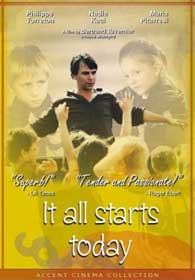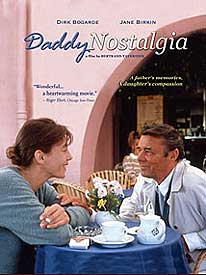In his own old age Bertrand Tavernier's former genius for filmmaking seems to have withered into a dulled competence, or become subsumed into a combination of familial devotion (letting family members participate too much in the creative process), & married by the mawkishly nostalgic.
Daddy Nostalgia (1990) focuses on a few of the obsessions of old age, though imposing much of this enfeebled thinking on the daughter as point of view character. By right of starring Dirk Bogarde as the dad it's almost a good movie just for the acting, but not quite. It tells no story of any strength; it is about nostalgia for the sake of nostalgia.
Bogarde seems to have scored this role because he so easily emblemizes the past & all things vanished, not because the role required a fine actor. He comes off as the mouthpiece for the director & his ex-wife (the scriptwriter), as a happy old chap from the whitest of white privilege & wealth, having a few grumpy opinions on life's injustices & stupidities which his daughter is supposed to applaud whether or not she fully agrees.
The Riviera setting & the decadent wealth fobbed off as good & worthy -- & so tragic that such privilege faded with youth -- makes these characters unacknowledged villains. They deserved to be slaughtered by peasants during some revolution & here they are complaining because life was too good to them & them alone for death in a warm bed in old age to be fair. There's simply no self-awareness at any level of this film -- not in the writing, not in the direction, not in the acting of the appallingly anal script.
Happy directors tend to be bland & their criticisms of injustices mere breakfast chitter-chatter. This nostalgia for an age of wealth & servants & cocktails totally overlooks the criminality of such people fiddling while the world burnt. I despise these characters but the director seemed really to want us to find some universality in them, to relate to issues of family love & missed opportunities of communication.
So the father-daughter relationship central to this soap opera does have a personal feel to it, but capturing conventionality & inconsequentiality was not for me sufficient to arrive at a winning film. I do like to watch Bogarde work even in a minor film, & Jane Berkin as his daughter does have a remarkable face. So there were two components for fine performances (Odette Laure as the mom is badly back-burnered, & not pleasant when she does step forth). There wasn't a script worthy of their efforts & they did not rise so high as to save the script from its own mawkish tendencies.
Flashbacks to the daughter's part in the privileged past as a vaguely neglected child were more interesting than the main part of the film, but added up to very little. The film takes a combination of fond & bittersweet memories & attempts to upraise banality to the level of entertainment & for me fails. What is lacking here is any sense of layering or irony or conflict; it's straightforward gung-ho "My daddy was imperfect but I love him" or "I was not a prefect father but ain't I a likeable old fart" deprived of any depth.
I do think soap opera lovers will find it emotionally involving, but a film of such simpleminded sentimentality will never be high-end for Tavernier. And it was weird to see such overt product placement even in a little French film. It's just way too bad when the Coke is more memorable than any other portion of the film.
 Wearing it's political agenda like an enormous floppy pokadot hat, It All Starts Today (Cu commence aujourd'hui, 1999) is set in a French village where coal mines are closing & poverty is on the rise. Families are falling apart & children are suffering.
Wearing it's political agenda like an enormous floppy pokadot hat, It All Starts Today (Cu commence aujourd'hui, 1999) is set in a French village where coal mines are closing & poverty is on the rise. Families are falling apart & children are suffering.
The film is based on thoroughly accurate conditions & it too often allows the story to come to a screeching hault in order to indict the government bureaucracy.
A preschool teacher (Philippe Torreton) is trying to find order in this chaos. When school lets out the parents arrive to take the children home, but one child remains. When her mother at long last arrives, she's falling-down drunk. In the teachers' presence, she's suddenly overcome with a drunkard's embarrassment, & runs off leaving her daughter behind. Plus she has left behind her infant in a stroller.
Now the teacher Daniel is stuck with two kids. If he calls the authorities, things will just get worse for the kids, so he has got to find another way, before having himself to face a desparate mother's inconceivably horrific act.
This is just the first of a long string of issues Daniel must constantly attend to & resolve. In a series of vignettes we see the politics, needs, sorrows, & actual strangeness of the preschool education system in a poor neighborhood, & the callousness of government officials.
Aa bruised child won't admit he's abused. There are problem children, problem parents, & there are sweet kids trying to thrive in terrible poverty.
It all Starts Today is mostly about the lives of teachers who care, who will go so far as to orchestrate an actual revolt in the childrens' behalf. And yet the child of our hero's own girlfriend (Maria Pitarresi) hates David & may well be spiraling out of control.
It begs comparison to Truffaut's Small Change (1976) which it doesn't equal though it's a good little film, & it's much more about a preschool teacher rather than a child's-eye-view as in Truffaut's greater work.
Tavernier has reached for the same level of sensitivity & compassion as Truffaut, but he has not striven for cinematography with any striking merit. He relies on the shaky hand-held camera capturing character & emoton to empower the film, but the cheap look & indifferent framing weakens even what is best.
copyright © by Paghat the Ratgirl
|

